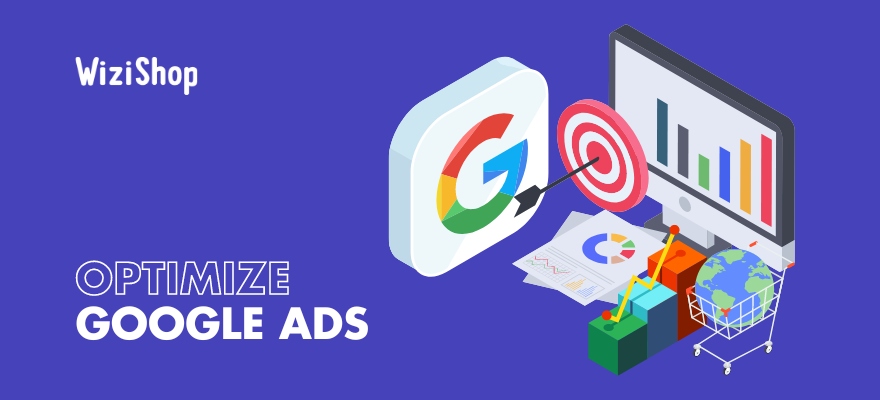Everyone knows that search engines are the most important lever to help create traffic for an online store.
On the one hand, we have search engine optimization (SEO), which requires a lot of time and a lot of work to position the site and its content well and obtain satisfactory results. On the other hand, online advertising is a solution for a faster return on investment (ROI), making it possible for companies to boost their visibility with their target audiences in a shorter amount of time.
On Google, with Google Ads (formerly Adwords), you publish sponsored ads that’ll appear in the search results when a user has typed one of the keywords on which you have programmed bids.
However, an e-merchant who’s just launched their online store doesn’t necessarily have a big budget to spend to promote their products through large advertising campaigns.
Here are 10 tips to optimize and improve your Google Ads with a small budget.
Introduction to Google Ads
What is Google Ads?
On Google, millions of internet users search for specific topics using keywords. Google provides the internet users with results, links which it considers relevant to answer their requests.
On the results page, organic links are proposed but also commercial links linked to keywords and configured advertisements.
Google Ads is the Google service that allows advertisers to create their campaigns according to their needs, their monthly budget, and their precise commercial objectives.
Advertisers then create their Ads account and launch their campaigns targeting specific audiences, following the rules set by Google.
Display, Shopping, SEA... How do you understand Google Ads?
Google Ads is an advertising network that allows you to manage your ads and ad groups in relation to the results of internet users. When you’re ranking on search engines in a natural way, with the help of your writing and optimization work (good web writing practices, a striking title, well-chosen keywords and exact expressions used, etc.), we’re talking about search engine optimization (SEO).
When the ranking links are commercial links highlighted on search engines, we’re talking about paid search campaigns, search engine advertising (SEA).
Several sections and formats of online advertising exist via Google Ads to allow brands and professionals to reach a maximum number of internet users and therefore potential customers:
- Text ads: available to everyone, they contain only words and look like traditional results.
- Responsive ads: they adapt to the screen on which they’re displayed and offer different content depending on the space.
- Illustrated ads: these are ads especially developed in Display campaigns that contain an animated or static image, ideal for a promotional campaign, for example.
- Video ads: advertisers can broadcast their video ads on Google's partner sites (such as YouTube).
- Call-only ads: these allow the user to be directed to the phone number and direct contact with the company (for a quote request, for instance).
- Shopping ads: first-class ads in ecommerce, they include product photos, title, price, actions with promotions, the name of the online store, and a description of the item. To learn more, follow our guide on Google Shopping.
How do you choose your bids and increase your Google Ads optimization rate?
Several types of bids exist on Google Ads:
- Cost per click (CPC): this is the most used auction. The CPC is charged per click on the ads. Google Ads makes sure to optimize the campaigns to maximize the click-through rate (CTR).
- Cost per thousand (CPM): this is the price paid by the advertiser when the ad has been displayed 1,000 times. The objective is to offer a maximum of visibility to the brand or its landing page.
- Cost per acquisition (CPA): the bid is charged here according to each conversion. The payment is therefore related to the follow-up of the conversions (contact, sale, subscription to the newsletter, etc.).
How do you structure your Google Ads campaigns? The 10 key techniques
1. Define your objectives
Launching one or several Ads campaigns will allow you to know which keyword generated the visit on your site, on which support the user visualized your ad groups, and if it ended up generating a sale.
So define your objectives and choose if you want to generate sales (by targeting potential buyers ) or launch a campaign to improve your brand awareness.
2. Start with the Google Search feature
This feature allows you to choose a list of keywords and optimize your ads for them.
They’ll be displayed when a user uses these keywords to search.
This way, you can control the budget on your ad groups from the beginning. By improving your campaigns day after day, you’ll increase the quality of your traffic and count on a better CTR.
Once you’re comfortable with the Search feature, you can eventually set up a Google Ads remarketing campaign.
3. Make use of the long tail to improve your performance
Don't spend your entire budget on broad queries such as "shoes" or "furniture."
Instead, try to choose keywords that really represent and describe the product or the category of products you want to promote: this will represent a competitive advantage because you’ll be able to target a qualified audience more easily with these terms.
Therefore, choose very precise keywords when optimizing your ads. These might be terms such as "red women's shoes," "white bedroom furniture," or even queries by geographical area if you have a physical business and an ecommerce store, like "buy furniture Paris" for example.
The competition for these types of keywords will be weaker, and you’ll have better visibility.
4. Don’t aim for the first position but for the quality of the ads
Several solutions are available to you: either define the "absolute first position" to be positioned at the top of the search engine results page (SERP), or choose "first position" to appear between positions 2 and 4.
However, be careful: appearing in the first position will generate more clicks on your ads but not necessarily more sales. If you’re availing of pay-per-click (PPC) ads, you may find that your advertising budget is rapidly dwindling without increasing your conversions in terms of product orders.
5. Pay attention to the Quality Score of the keywords
The quality rating of the keywords you’ve chosen, called "Quality Score," determines the price that you’ll pay for each click.
The Quality Score of the keywords is determined by three main criteria: the relevance of the ad copy to the keywords, the CTR of the ad, and the relevance of the landing page to the keywords.
Aim to get a Quality Score between 7 and 10 for each keyword and try to win the best place at the best price with your PPC ads.
6. Calculate your ROI in relation to the CPA
The cost per acquisition indicates the price you have to pay to generate a conversion on your site or your landing page.
Be careful, a conversion isn’t necessarily a sale!
Depending on your objective, it can be the registration of a new user, the subscription to your newsletter, or a simple click on the "Like" button of your Facebook page.
We therefore advise you to make sure that you set up the right conversion events so that you don’t measure and/or optimize the algorithm for metrics that aren’t relevant to the business in question, in order to ensure a maximum level of quality in your campaign.
7. Monitor the competition on a daily basis
You always have something to learn from your competitors. Thanks to tools like Semrush and the data they offer, you’ll be able to know on which keywords the competitors of a given website are bidding.
In case it’s difficult to identify your direct competitors in your sector of activity, a tool allows you some helpful data in Google Ads: look at the "Bids analysis" tab in a given campaign on Google Ads to see which companies are bidding on the same keywords.
Review this tab to check if they’re publishing ads for the same keywords that you’ve chosen in order to evaluate the potential to rank your site or your landing page for those terms. This data will also confirm that your target often uses them for their searches.
8. Take advantage of ad extensions
Extensions are additional links that you can add to your ads to push the user, even more, to action and boost the performance of your ads.
You can insert direct links to certain products, to promotions or, when it's time, to dedicated landing pages (sales, holidays: Black Friday, Easter, etc).
You can also give the possibility to those who connect via mobile, to call you directly, thanks to a single button.
Ad extensions can be great tools for optimizing your PPC ads, as they can help you increase the CTR of your ads and, consequently, lower the CPC of your campaigns.
9. Analyze performance regularly
The only way to avoid wasting all your budget in a few minutes is to regularly review the performance of your campaigns.
Don't just look at the ROI but exclude all the keywords that don't bring any beneficial visits and the ads that don't generate interest from users.
When optimizing your Google Ads strategy, you’ll want to keep only the elements that, in terms of quality/price/performance ratio, bring you the best results.
10. Analyze the ROI in relation to your objectives
While the first tip was to structure your campaigns well by defining the objectives, our last tip is to analyze the results of your different marketing levers and to know if your objectives have been reached.
The main goal of Ads campaigns, for a store, is to generate sales. In ecommerce, Google allows sellers to take advantage of Shopping ads, a powerful tool that allows you to showcase your product catalog in photos and with an optimal commercial presentation on the entire Google network.
You’ll be able to increase the qualified traffic and calculate exactly the ROI of your campaigns.
An entrepreneur who’s just launched a new business is often afraid of making mistakes and jeopardizing their success. By following these tips and with accurate knowledge of your market and your prospects, you can activate high-quality, profitable, and fast-performing campaigns.
Guess what? At WiziShop, we’re officially Google Partners. Set up your Google Ads campaigns and start boosting your sales with this indispensable ecommerce marketing tool.
In addition, you get a 7-day free trial to test the 400+ ecommerce features, 50+ SEO optimizations, the support of our business coaches, and complete ecommerce training offered at no extra cost!
Our ecommerce CMS is ultra efficient concerning the issue of SEO: we offer you a healthy, solid base, so that your efforts are rewarded thanks to the support of your daily actions. By coupling SEO and SEA, you’ll manage to better target your audience and perform wonders on Google!
Your internet adventure is waiting for you: start your ecommerce project with WiziShop now and create a Google Ads campaign to boost your marketing efforts and help make your sales activity a commercial success!
Try WiziShop free for 7 days
THE EASIEST NO-CODE ECOMMERCE SOLUTION✅ No credit card required
✅ Access to all features
✅ No commitment










